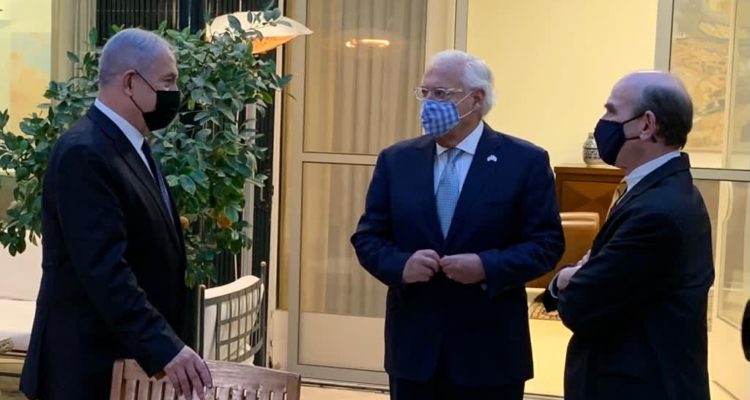Trump’s special envoy held talks with Netanyahu. Secretary of State Pompeo is expected to arrive in the region on Nov. 18 to push further Iran sanctions.
By Paul Shindman, World Israel News
The Trump administration’s special envoy on Iran held talks in Jerusalem with Prime Minister Benjamin Netanyahu to discuss the Iranian threat, the U.S. Embassy in Israel reported Sunday.
Elliott Abrams, the Special Representative for Iran and Venezuela, arrived in Israel on the weekend, and after holding additional talks Monday with Defense Minister Benny Gantz and Foreign Minister Gabi Ashkenazi, he will head to the Gulf region for talks in Saudi Arabia and the United Arab Emirates.
The embassy tweeted that Abrams met Netanyahu “to discuss issues of mutual concern such as countering Iran’s malign actions.” Both Gantz and Ashkenazi are retired generals who served as commander of Israel’s military before turning to politics.
Abrams’ surprise visit to the region comes as the Trump administration is expected to add “a flood of sanctions” on the Islamic Republic in order to “make it harder for the Biden administration to revive the 2015 nuclear deal,” Israeli sources told the Axios news website, which also reported that Secretary of State Mike Pompeo will arrive on Nov. 18 to push the Iran issue.
“The goal is to slap as many sanctions as possible on Iran until Jan. 20,” when the next president is inaugurated in Washington, the source said, because the Trump administration believes it will increase pressure on the Iranians and make it harder for the Biden administration to revive the 2015 nuclear deal.
On Saturday, Abrams’ office announced the special envoy will be in the region November 7-12 “for consultations on Iran.”
Iran has for decades threatened countries in the region, and Iranian leaders have repeatedly stated their goal is the “total annihilation of Israel.” Iran’s population is predominantly Shiite Muslim, and the leaders of the Islamic Revolution there have repeatedly threatened neighboring Gulf states that are predominantly Sunni Muslim.
The Obama administration brokered the Joint Comprehensive Plan of Action (JCPOA) under which economic sanctions on Iran, widely believed to be developing nuclear weapons, would be lifted if the Iranians scaled back their nuclear program. Israel strenuously objected to the deal, which expires after 15 years and would free Iran to to resume its weapons program.
In 2018, Trump pulled out of the nuclear deal, saying the Iranians had lied about their intentions. For years, Iran had blocked international inspection of its nuclear sites and had totally hidden one major facility, provoking international outrage and sparking UN sanctions against the country.
“The Iran issue will likely be the focus of the [Biden] administration’s Middle East policy,” wrote Michal Hatuel-Radoshitzky and Eldad Shavit of the respected Institute for National Security Studies in Tel Aviv.
In a paper assessing the “changing of the guard” in Washington, the two specialists in Middle East geopolitics noted that during the campaign, Biden wrote an op-ed outlining “his commitment to prevent Iran from attaining nuclear weapons and to return the United States to the JCPOA if Iran fulfills its obligations, as outlined in the agreement.”
They said that despite Biden calling for renewed negotiations with Tehran, he has not revealed his position on the Iranian demand that all U.S. sanctions be lifted and Iran receive compensation for the economic damage it claims Trump caused.
The INSS paper noted that whether negotiations with Iran are renewed or the Islamic Republic escalates the situation, “Israel should anticipate gaps between its interests and those of the United States.”





